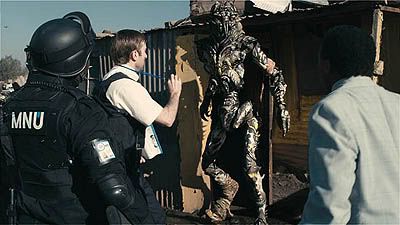
It’s hard to remember a film with a more bleak outlook on humanity than the sci-fi tale District 9.
Directed by Neill Blomkamp, whose resume includes only commercials, music videos and the 2005 short Alive in Joburg, upon which District 9 is based, and produced by Peter Jackson (The Lord of the Rings), the movie offers a frightening take on human nature and what might occur if aliens ever make it to Earth.
The setup is genius. About 20 years ago, a giant spaceship parked itself here—not above New York or Chicago or Los Angeles, but Johannesburg, South Africa. It hovered there until humans forced their way inside and found the insect-like alien inhabitants, more than a million malnourished worker drones, their leadership gone and now lacking the ability to make their own decisions.
Our reaction is beneficent at first, transporting the aliens to the ground, feeding them, essentially nursing them back to health. They are given a place to liv —District 9. But it doesn’t take long for prejudice to arise. Humans derisively call the aliens “prawns” for their crustacean-like appearance. Violence erupts inside and outside of District 9, which gives slums a bad name. Gangs move in to take advantage of the situation.
The government’s solution is to move the aliens farther from the city, where instead of thin-walled shacks, there are tents. Wikus van de Merwe (Sharlto Copley) is the unqualified bureaucrat put in the charge of the relocation effort.
Presented in a montage of talking heads and news footage, the introductory sequence is masterful. Blomkamp maintains the documentary feel throughout.
From the outset, Wikus is in way over his head. He’s arrogant, condescending and more interested in mugging for the camera crew following him than getting any serious work done. His demeanor when, while trying to evict an alien named Christopher Johnson and his family, he is exposed to a mysterious black fluid. The encounter changes him, and soon he is on the run from his own employers, forced to hide out in District 9 and form an uneasy alliance with Christopher.
What Blomkamp, who co-wrote the screenplay with Terri Tatchell (though much of the dialogue was adlibbed), does best is play with our loyalties. We naturally side with the humans at first. The “prawns” are grotesque creatures and we offer them aid. But the humans subsequent treatment of them goes beyond mean and prejudicial—it’s cruel. Sure, they look different, but they only want the same things we do. Take Christopher, who is simply trying to hold his family together and find a way to go home. And he shows more loyalty to Wikus than Wikus does in return.
As effective as the faux-documentary format is early on, it becomes a hindrance later. I’m sure the intent is to enhance the realism, but that is accomplished in the first 15 minutes. When the action ramps up (and rarely pauses for breath), the combination of nonstop gunfire and explosions and the shaky camerawork is too much to handle on the big screen. Though I’m not an opponent of the handheld camera in general, it’s suffering from overuse.
Maybe I’m also not overly enthusiastic about this movie because it accomplishes what it tries to do a little too well. I didn’t care about a single human character. Presumably, Wikus is a changed man by the end, but he’s so awful at the start that it’s hard not to think that what he got was more than he deserved.
Grade: C
(Rated R for bloody violence and pervasive language. 112 minutes.)
No comments:
Post a Comment